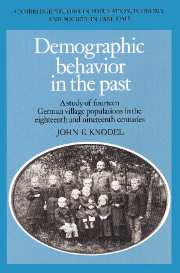 Demographic Behavior in the Past
Demographic Behavior in the Past Book contents
- Frontmatter
- Contents
- List of tables
- List of figures
- Acknowledgements
- PART I INTRODUCTION
- PART II MORTALITY
- PART III FAMILY FORMATION
- PART IV MARITAL REPRODUCTION
- PART V INTERRELATIONSHIPS IN DEMOGRAPHIC BEHAVIOR
- PART VI CONCLUSION
- Appendices
- A Selection of couples for analysis
- B Assessment of the quality of demographic data contained in German village genealogies
- C Local village conditions
- D The occupational and status classification schemes
- E Calculation of infant and child mortality risks
- F Prevailing infant-feeding patterns
- G Evidence of biases in the determination of legitimization status
- Bibliography
- Index
B - Assessment of the quality of demographic data contained in German village genealogies
Published online by Cambridge University Press: 04 August 2010
- Frontmatter
- Contents
- List of tables
- List of figures
- Acknowledgements
- PART I INTRODUCTION
- PART II MORTALITY
- PART III FAMILY FORMATION
- PART IV MARITAL REPRODUCTION
- PART V INTERRELATIONSHIPS IN DEMOGRAPHIC BEHAVIOR
- PART VI CONCLUSION
- Appendices
- A Selection of couples for analysis
- B Assessment of the quality of demographic data contained in German village genealogies
- C Local village conditions
- D The occupational and status classification schemes
- E Calculation of infant and child mortality risks
- F Prevailing infant-feeding patterns
- G Evidence of biases in the determination of legitimization status
- Bibliography
- Index
Summary
In any demographic study of the past, the validity of the findings depends on the accuracy and completeness of the source material and, if applicable, on the appropriateness of the techniques employed to overcome known shortcomings in the data. In this study, which is based on analysis of family reconstitution data from German village genealogies, the data are generally treated as if they are accurate although, in the case of data on infant and child mortality, only for specified periods of time for some villages. In this appendix, the quality of the data is assessed and the basis for determining the periods during which mortality data are assumed to be accurate is provided.
Accuracy of transcription and reconstitution
While the data for this study come directly from the village genealogies, those genealogies are in turn based on the parish registers and, in some cases, also the civil registers. Thus the accuracy of the data being used depends both on the completeness with which vital events were reported in the parish and civil registers and on the accuracy with which the genealogist transcribed these events and compiled them into reconstituted family histories. Details of a study have been reported elsewhere in which a sample of entries in the registers of four villages was compared with events recorded in the corresponding village genealogies to see if the events were included and accurately stated.
- Type
- Chapter
- Information
- Demographic Behavior in the PastA Study of Fourteen German Village Populations in the Eighteenth and Nineteenth Centuries, pp. 478 - 502Publisher: Cambridge University PressPrint publication year: 1988


